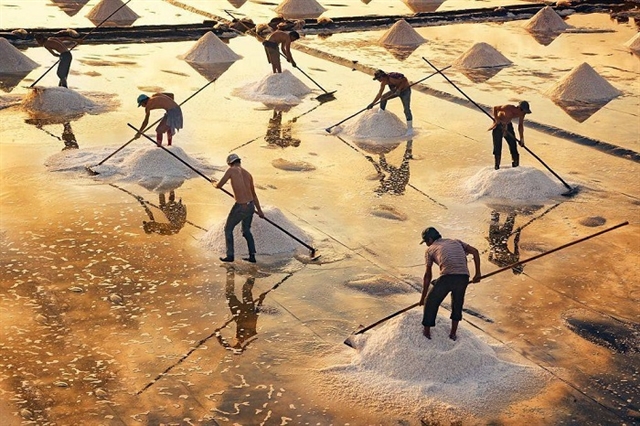 Life & Style
Life & Style


|
| The recognition of the salt making craft of the southern province of Bạc Liêu as the national intangible cultural heritage.was presented to representatives of local authority. — VNA.VNA Photo Nhật Bình |
BẠC LIÊU — The salt-making craft of the southern province of Bạc Liêu has been recognised as national intangible cultural heritage.
A ceremony to grant the recognition was recently held at Điền Hải Commune, Đông Hải District by the Department of Culture, Information, Sports and Tourism of Bạc Liêu Province in co-ordination with the People's Committee of Đông Hải District.
Speaking at the ceremony, Vice Chairman of Bạc Liêu Provincial People's Committee Cao Xuân Thu Vân said the recognition is not only the pride of the province but also a contribution to preserving the treasure of Việt Nam's intangible cultural heritages.
It would also help domestic and international friends better understand the culture of the coastal areas of the district and Bạc Liêu Province, she added.
The vice chairwoman suggested the community and local authority continue to preserve and develop the traditional salt-making craft, including by expanding salt-making acreage, improving salt quality, creating better living standards for local salt-farmers and building the Bạc Liêu salt brand.
The provincial Department of Culture, Sports and Tourism will provide instructions on building tourism products featuring salt-making experiences, as well as creating souvenirs and medicinal products from salt.
In co-ordination with the People’s Committee of Đông Hải District, the department will hold an annual salt festival to attract tourists to the region.
Meanwhile, the Department of Agriculture and Rural Development of the province will develop mechanisms and policies to help salt farmers stabilise their lives, as well as strengthen guidance and transfer of modern scientific and technical applications to increase productivity and improve salt quality to help salt farmers feel secure to pursue their traditional craft and pass it to the next generations.
At the same time, the local traffic system will be improved, creating convenient transportation and serving the needs of tourism development.

|
| Salt-farmers in Bạc Liêu Province work on the feilds that stretch for tens of kilometres along the coast. Photo luhanhvietnam.com.vn |
Heritage values
According to the director of the Department of Culture, Sports and Tourism of Bạc Liêu Province, Trần Thị Lan Phương, the traditional craft of salt-making in the province has existed for a long time.
“The farmers in Bạc Liêu Province are known for their expertise in salt-making. The craft used to be thriving in the past, yielding sufficient salt to supply six southern provinces and even nearby countries,” she added.
The salt fields stretch for tens of kilometres along the coast, from Vĩnh Châu beach to Gành Hào estuary. In the early years of the 20th century, salt-making was one of three major economic sectors, after rice and aquaculture, making the province one of the three major economic centres of the Mekong Delta.
The production process was formed and passed down through many generations of farmers and to this day, the basic techniques are still maintained, together with the assistance of modern machinery to improve productivity.
Salt produced in Bạc Liêu often has a strong and unique taste due to the low content of magnesium, calcium and sulfate. Meanwhile, the Natricloride content is very high, accounting for 96.6 per cent on average, nearly equal to Việt Nam's premium salt standard at 97 per cent.
This is the first time a cultural heritage of the province has been included in the National List of Intangible Cultural Heritage. — VNS




